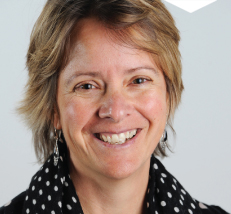 DEAN’S REPORT
DEAN’S REPORT
AssOCIATE ProfEsSOR Suellen Shay
Our research is driven by our mission to promote equity of access, effectiveness of teaching and learning, and the enhancement of curriculum.
The Centre for Higher Education Development (CHED) has at its core the twin aim of improving student success and ensuring that UCT’s graduates are globally competitive, locally relevant, socially responsive and fully representative of South Africa’s diverse population. Our research is driven by our mission to promote equity of access, effectiveness of teaching and learning, and the enhancement of curriculum.
To strengthen its research, CHED has, following an external review conducted in 2012, formulated a Strategic Plan for Research. The ultimate aim of this plan is to develop CHED’s research capacity and improve its research output and dissemination. Accordingly, the strategic plan has the following key goals: to identify and develop research areas and groups addressing critical concerns in higher education at institutional, local, national and international levels; to produce excellent research by building and enhancing the capacity of CHED staff; to facilitate and promote the dissemination of CHED research through participation in research-led teaching and learning interventions, institutional decision-making, planning processes, and higher education policy work; and publication and participation at conferences to establish a viable and sustainable funding base for CHED research.
While it is too early to assess the success of this strategic plan, there is no doubt that it has helped to provide strategic research direction for CHED’s five units. In 2013, CHED saw an increase in the number of its research outputs. Although the number of peer-reviewed articles remained almost the same as in previous years, there was a significant increase in the number of books, book chapters and conference proceedings published. Most of the journal articles and book chapters published during 2013 deal with diverse themes pertinent to CHED’s mission and goals. The Academic Development Programme (ADP) and Centre for Innovation in Learning (CILT) published the most journal articles, book chapters and conference proceedings. ADP, as the biggest unit of CHED, made a significant contribution to educational development scholarship through its peer-reviewed articles, book chapters and conference proceedings.
These research outputs covered a wide range of themes in academic development and support. They included analysis of the textual practices of undergraduate and postgraduate students, evaluation of the impact of academic development intervention programmes in different disciplines, student identities and learning, risk in postgraduate studies, academic literacies and multimodality, and tutoring and higher education policies and practices. However, their main focus was on the use of educational technology and higher education studies, including topics such as emerging technologies and changing learning/teaching practices, interactive mobile lecturing models, the use and effectiveness of educational technology in African higher education, development of online teaching material, educational technology pedagogic strategies, digital literacy, curriculum studies, and open access. Themes published by other units such as The Centre for Educational Testing for Access and Placement (CETAP) included the development of assessments that enable alternative access and appropriate placement of students in different academic programmes.
CHED also ran various research projects during the period under review. One of these projects was the Research on Open Educational Resources for Development (ROER4D), convened by Cheryl Hodgkinson-Williams in CILT. This is a three-year international project worth C$2 million, spanning Latin America, Sub-Saharan Africa and Central, South and South-East Asia. It addresses the research question: in what ways and under what circumstances can the adoption of OER address the increasing demand for accessible, relevant, high-quality and affordable post-secondary education in the Global South? ROER4D comprises 12 research projects, and includes desktop reviews, a cross-regional survey, case studies on OER adoption by academics, teacher educators and students, mapping studies on educational expenditure, impact studies of OER in various contexts and one complete country study. As well as South Africa, other countries in the project include Ghana, Kenya, Brazil, Colombia, Chile, India, Indonesia, Malaysia and Mongolia. The project also involves a number of capacity-building activities around quantitative and qualitative data analysis, using qualitative software analysis tools and evaluation and research communication methodologies.
Another CHED highlight was the Emerging Information and Communication Technologies (ICTs) in Higher Education and Large Classes Project. This was a joint project by a number of institutions of higher education in South Africa: in addition to UCT, it included the University of the Western Cape, the Cape Peninsula University of Technology, Stellenbosch University, the University of Pretoria, the University of the Witwatersrand, Rhodes University and the University of Fort Hare. This project investigated how qualitative outcomes in education could be realised through the use of emerging technologies to transform teaching and learning interactions and paradigms across differently positioned higher education institutions in South Africa. The Large Classes Teaching Project was launched in September 2008 with an Andrew Mellon Foundation grant of US$330 000 to be used over four years. The aim of the project was to understand what was required to improve student performance in South African higher education.
there was a significant increase in the
number of books, book chapters and
conference proceedings published.
To enhance CHED research capacity, 12 staff members participated in the “Writers’ Development Workshop” organised by the Research Office, the purpose of which was to assist staff to prepare their articles for publication and rewrite chapters of their theses. This was intended to provide writers with critique and feedback on prepared papers and thesis chapters and give them time in a congenial environment to amend and improve these, as well as to provide them with time for discussion and dialogue to enhance creativity and promote fresh ideas for writing and research. The “Writers’ Development Workshops” and other research capacity-building initiatives proposed in the CHED Strategic Plan for Research augur well for the future growth and development of CHED’s research.


